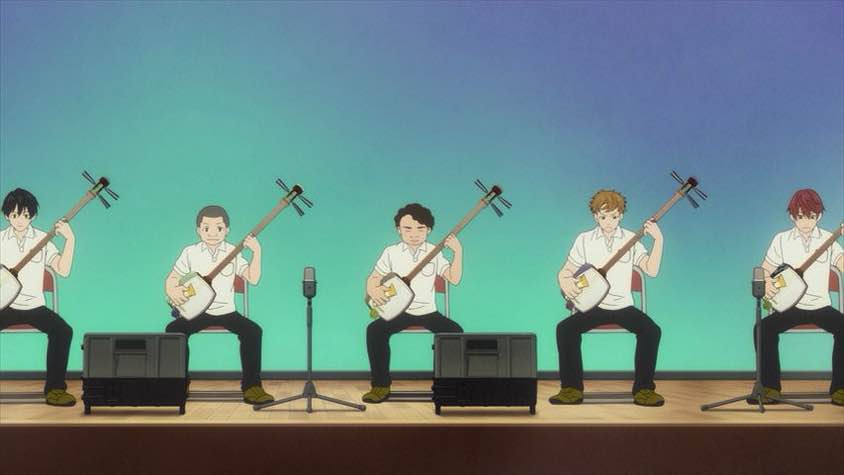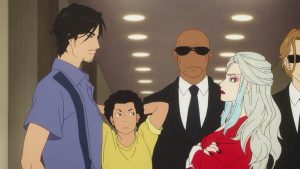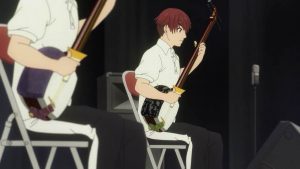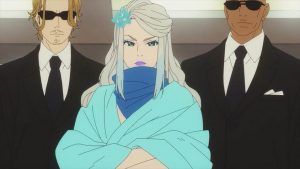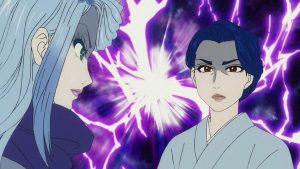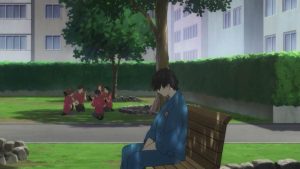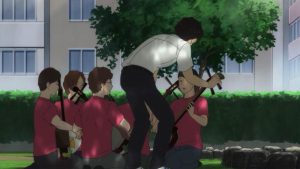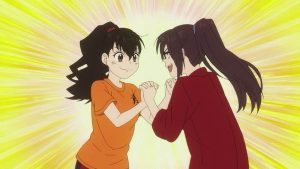 While I’d probably rank this episode of Mashiro no Oto right around the series’ average, it took a bit of a different route to get there. Absent the usual extreme highs and lows, this was just kind of a moderately good middle zone. The series has pretty much lapsed into full sports anime mode here, and that’s fine. The weaknesses (mainly a lot of the characters and the humor) were fully on display, but so were the strengths. If a music show’s best element is the music, you definitely don’t want to skimp on the tournament arcs.
While I’d probably rank this episode of Mashiro no Oto right around the series’ average, it took a bit of a different route to get there. Absent the usual extreme highs and lows, this was just kind of a moderately good middle zone. The series has pretty much lapsed into full sports anime mode here, and that’s fine. The weaknesses (mainly a lot of the characters and the humor) were fully on display, but so were the strengths. If a music show’s best element is the music, you definitely don’t want to skimp on the tournament arcs.
 That said, there was an awful lot of silliness involved in this, starting with those pajama super-sentai uniforms, and needless to say anything and everything Umeko-related. When you compare a show like Mashiro no Oto against something like Chihayafuru or Kono Oto Tomare (and it’s hard not to), you’re struck by how much more awkward the connective tissue is – the character dynamics, the dialogue, the cringeyness of certain characters. But then when the playing starts it catches right up. Unlike earlier eps the good and awkward parts are so mixed together this week that they don’t feel distinct from each other.
That said, there was an awful lot of silliness involved in this, starting with those pajama super-sentai uniforms, and needless to say anything and everything Umeko-related. When you compare a show like Mashiro no Oto against something like Chihayafuru or Kono Oto Tomare (and it’s hard not to), you’re struck by how much more awkward the connective tissue is – the character dynamics, the dialogue, the cringeyness of certain characters. But then when the playing starts it catches right up. Unlike earlier eps the good and awkward parts are so mixed together this week that they don’t feel distinct from each other.
 Both of the Tanuma siblings are here, but only the brother, Soucihi, is entered. That’s because Mai was only interested if Setsu was playing – and she didn’t find out until too late that he was entered in the individual competition (she doesn’t seem like the team type). She tries to bully her way into the competition anyway but her mother scolds her for it. That’s the last thing the mother and Umeko agree about, as they engage in a rather labored staredown that doesn’t generate much in the comedy department. Umeko’s biggest laughs here are the sheer absurdity of her persona, as epitomized by the opening ceremony.
Both of the Tanuma siblings are here, but only the brother, Soucihi, is entered. That’s because Mai was only interested if Setsu was playing – and she didn’t find out until too late that he was entered in the individual competition (she doesn’t seem like the team type). She tries to bully her way into the competition anyway but her mother scolds her for it. That’s the last thing the mother and Umeko agree about, as they engage in a rather labored staredown that doesn’t generate much in the comedy department. Umeko’s biggest laughs here are the sheer absurdity of her persona, as epitomized by the opening ceremony.
 Again, the dynamic within the club is pretty flat. The whole spat between Kai and Setsu feels like a rerun that’s totally unnecessary. Wakana arrives to- well, to do several things. Check up on his brother, warn his mother not to go too far in running his life, and eventually smooth things over with Setsu’s clubmates. We also start to meet some of the other players in the youth shamisen world – a cocky bastard named Arakawa Ushio, and a club from Osaka called “Billiken” (a famous Osakan mascot character) whose star player is Kaji Takaomi (note for producers: casting Kaji Yuki for characters named Kaji is not mandatory).
Again, the dynamic within the club is pretty flat. The whole spat between Kai and Setsu feels like a rerun that’s totally unnecessary. Wakana arrives to- well, to do several things. Check up on his brother, warn his mother not to go too far in running his life, and eventually smooth things over with Setsu’s clubmates. We also start to meet some of the other players in the youth shamisen world – a cocky bastard named Arakawa Ushio, and a club from Osaka called “Billiken” (a famous Osakan mascot character) whose star player is Kaji Takaomi (note for producers: casting Kaji Yuki for characters named Kaji is not mandatory).
 The performances are, as ever, the highlight – though most of them are pedestrian by design and one suspects Souichi will deliver the headliner. The Billiken rendition stands out among a rash of bland modernized takes on “Jongara Shinbushi” that make little impact. It’s a little sterile but tight as a drum – by far the most elegant and precise group performance we’ve heard over the course of the series. The musical dichotomy that’s being set up here looks pretty obvious, and Billiken is going to be at one end of the spectrum. It’ll be interesting to hear where Souichi falls, as musically speaking he’s the biggest unknown quantity in Mashiro no Oto at the minute.
The performances are, as ever, the highlight – though most of them are pedestrian by design and one suspects Souichi will deliver the headliner. The Billiken rendition stands out among a rash of bland modernized takes on “Jongara Shinbushi” that make little impact. It’s a little sterile but tight as a drum – by far the most elegant and precise group performance we’ve heard over the course of the series. The musical dichotomy that’s being set up here looks pretty obvious, and Billiken is going to be at one end of the spectrum. It’ll be interesting to hear where Souichi falls, as musically speaking he’s the biggest unknown quantity in Mashiro no Oto at the minute.


